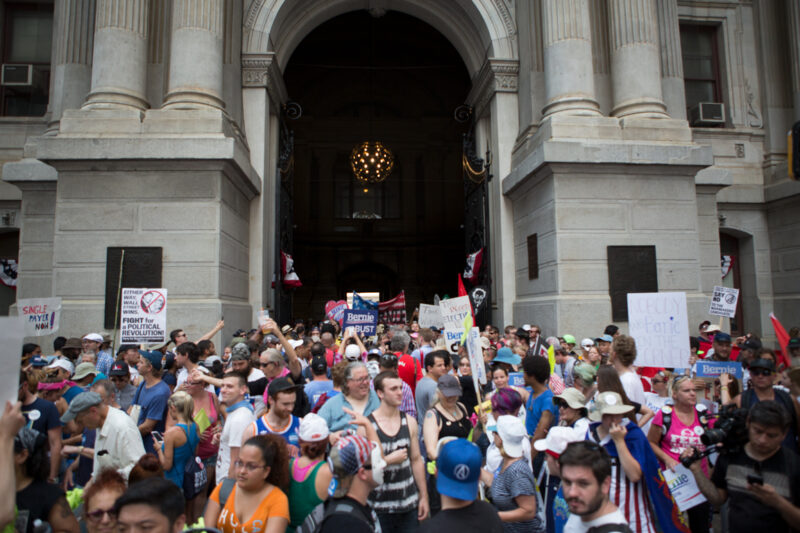
A version of this article originally appeared in STAND Magazine, a publication for ACLU members and supporters.
For months, political parties and presidential candidates fight for the highest office in the land, where the job duties include protecting the constitutional rights of all Americans.
Few things illustrate the practice of our most basic rights—namely those of speech, assembly and petitioning our government— better than the run-up to the presidential election. Candidates stake out their turf and the public listens, discusses, and absorbs the constant 24-hour election media cycle, opposing and supporting candidates with friends and family, on Facebook and in the streets. The product of this constitutional civics lesson is our new national political leadership.
So it’s ironic that both parties’ showcases—their national conventions—have historically been constitutional black holes. In 2004, hundreds of protesters at the Republican National Convention (RNC) in New York were wrongly arrested and held in abysmal detention conditions. Of course, the ACLU was there for them—the New York Civil Liberties Union and others filed suit on behalf of protesters that resulted in a total victory and a nearly $18 million award for those wrongly arrested, detained and fingerprinted.
"While we never shy away from going to court when constitutional rights have been wronged, protecting constitutional rights in the first place is the best result."
In 2008, the ACLU of Colorado took the lead after the indiscriminate and unconstitutional mass arrest of protesters at the Democratic National Convention (DNC) in Denver. Again, the case resulted in a full victory for protesters and led to changes in the city’s policies on crowd control and policing.
This year, the RNC came to Cleveland and the DNC came to Philadelphia. And we did everything in our power to ensure that constitutional rights were protected before and during the conventions—not just in the courts after the fact.
While we never shy away from going to court when constitutional rights have been wronged, protecting constitutional rights in the first place is the best result. Of course, we do this in the ACLU’s trademarked nonpartisan way: whether you’re left or right, a Democrat or Republican (or other!), pro or anti, we’re there to make sure your voice can be heard.
So at the ACLU’s Speech, Privacy & Technology Project, we marshalled resources to help ensure that at this year’s conventions, protests and political speech were protected. Our stellar affiliates are always at the forefront of the struggle for constitutional rights—and they’ll continue to serve that essential role. ACLU staff on the ground reached out to both activist communities and the police to get speech-protective rules in place well before the politicians came to town. At our national office, we added expertise about new technologies, policing policies, arcane federal agency roles, and lessons learned from past mass protest events.
For example, we monitored Cleveland’s hasty implementation of bodyworn cop cameras—a policy we support, but only with the right, thoughtful details in place to protect against both police brutality and unnecessary invasions of privacy. We tracked whether officials in either convention city used the fat $50 million check given by the federal government as it was intended—to help local law enforcement prepare for convention events instead of purchasing “Stingray” devices that surreptitiously track and record private cell phone data. And we made sure local media could monitor conventions and any related protests despite any “no-fly zone” imposed around the conventions by the Federal Aviation Administration. And we watched the FAA like a hawk.
We defend individual rights and liberties to increase the likelihood that this year’s convention-related activities are protected by the Constitution before we go to court. With close and constant work with ACLU affiliates, public records requests, technological expertise and know-your-rights advocacy, we’ve got a lot in our constitutional quiver.



